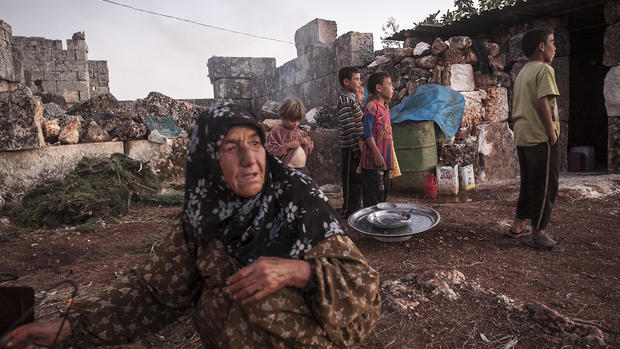Syria chemical inspectors destroy "critical" weapons equipment
BEIRUT International inspectors have visited 11 sites linked to Syria's chemical weapons program and destroyed "critical equipment" at six, the agency overseeing the elimination of the country's stockpile said Wednesday.
The team also supervised the destruction of unloaded chemical weapons munitions, said the Organization for the Prohibition of Chemical Weapons.
A joint OPCW-U.N. mission is to eliminate Syria's chemical weapons, precursor chemicals and production facilities by mid-2014. Syria is believed to have some 1,000 metric tons of blistering and nerve gas agents and the inspectors have to visit more than 20 sites, the OPCW has said.
Also Wednesday, U.N. Secretary-General Ban Ki-moon appointed Dutch Mideast expert Sigrid Kaag to lead the joint mission. Ban praised the U.N. Security Council for quickly approving Kaag's appointment, saying that as the mission's special coordinator "she will be responsible for overseeing all activities on the ground undertaken by the OPCW and the United Nations personnel" from Cyprus.
CBS News foreign affairs analyst Pamela Falk reports from U.N. headquarters in New York that Kaag's appointment was an important measure to keep track of developments and monitor compliance.
The team began operating in Syria at the beginning of October, and by last week, had visited three sites. Wednesday's update signaled a significant progress in the team's work.
The inspectors are being asked to complete a first round of site visits by the end of October, including verifying inventory and rendering production, mixing and filling facilities unusable. The next phase, of eliminating chemical agents, would begin after Nov. 1.
Experts say it's a tight timetable, especially since the inspectors are operating in the midst of a civil war. The head of the OPCW has said one of the sites is in rebel-held territory and that routes to other facilities linked to the chemical weapons program are near areas of fighting.
Meanwhile, there were growing signs of division among those trying to topple the regime of Syrian President Bashar Assad.
A rebel who claimed to speak for dozens of groups of fighters in southern Syria said they no longer recognize the authority of the country's main Western-backed political opposition alliance.
If confirmed, the announcement would serve as a new blow to the Syrian National Coalition and its claim to speak for those trying to bring down Assad. Southern Syria is considered a stronghold of the moderate, Western-funded opposition which appears to be losing ground to Islamic extremists.
In a video posted Wednesday, a bearded man in military fatigues stood in front of two dozen fighters, some holding up the emblem of the Free Syrian Army, the main Western-backed rebel alliance.
The man read out the names of more than 65 fighting groups, saying they feel abandoned by the political leadership and "withdraw their recognition" of the Coalition.
Louay Mikdad, a FSA spokesman, said groups mentioned in the video are part of the FSA-linked local military councils.
"We respect what they are saying," Mikdad said of the announcement. "We think our brothers in the Coalition, they should listen to the people inside, and they should open a direct dialogue with them."
In northeastern Syria, heavy clashes that erupted Tuesday and continued Wednesday between Kurdish gunmen and al-Qaida-linked rebels have killed at least 41 fighters, activists said.
The Britain-based Syrian Observatory for Human Rights said the fighting in Hassakeh province pitted Kurdish militias against rebels from two al-Qaeda-linked factions - Jabhat al-Nusra and the Islamic State in Iraq and the Levant.
Such battles between the groups have become common in recent months in the northeast, which has a large Kurdish population.
Observatory director Rami Abdul-Rahman said that 29 of the dead are from the two extremist groups, while the remaining 12 are Kurdish fighters.
In the southern province of Daraa, an explosion around midnight Tuesday killed at least 21 people, although activists and state media provided conflicting accounts as to what happened.
The Observatory said an explosion struck a vehicle packed with passengers near Tel al-Juma. It said four children and six women were among the dead.
It was not immediately clear what caused the explosion, nor why a group of women and children were traveling in dangerous and disputed territory in the middle of the night.
Syria's state news agency reported that 21 "terrorists" were killed when the car they were loading with explosives blew up inside a hideout. The government refers to those trying to overthrow President Bashar Assad as "terrorists."
Conflicting accounts are common in the Syrian conflict, in which both sides try to paint events in an advantageous light to score propaganda points.
The violence came as Muslims observe the holiday of Eid al-Adha, or the Feast of Sacrifice, and underscored just how relentless the violence in Syria's civil war is. Since its outbreak in March 2011, the conflict has claimed the lives of more than 100,000 people, and forced some 7 million to flee their homes.
Syria's revolt began with largely peaceful protests against Assad but later descended into civil war. Now in its third year, the conflict has carved the country up into rebel- and regime-controlled areas, with front-lines crisscrossing the country.


